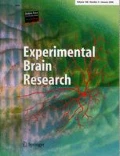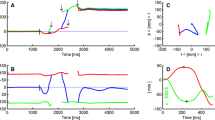Abstract
Recent experiments in healthy subjects have demonstrated that automatic postural responses can be suppressed when subjects are instructed to step instead of maintain stance in response to the surface translation. The aim of the present study was to investigate the role of the cerebellum in coordinating this interaction between the central command to step and peripherally triggered automatic postural responses. Eight subjects with cerebellar degeneration and eight control subjects were instructed to either maintain stance or step forward in response to a backward translation. In order to determine whether prediction of perturbation amplitude assisted suppression of postural responses, three platform translations were presented in both a serial (predictable) and a random (unpredictable) order. Cerebellar subjects were able to suppress their initial postural responses to the same amount as control subjects when instructed to step forward in response to backward translations, despite their hypermetria and inability to scale responses to predictable perturbation amplitudes. Control, but not cerebellar, subjects scaled the size of their postural responses to predictable perturbation amplitudes. The perturbation amplitude, however, had no effect on the size of early automatic responses when they were suppressed by instruction to step. The size of the suppressed postural response was independent of predictability of perturbation amplitudes in both control and cerebellar subjects. The dynamic interaction between automatic postural responses to an external perturbation and anticipatory postural adjustments for step initiation seems independent of prediction of perturbation amplitude and the integrity of the cerebellum. Although cerebellar subjects show larger-than-normal magnitude and variability of postural responses and an inability to scale the size of responses to predictable perturbation amplitudes, the cerebellum does not seem to be critical for suppression of the early postural response with a centrally intended movement.
Similar content being viewed by others
Author information
Authors and Affiliations
Additional information
Received: 2 September 1996 / Accepted: 18 August 1997
Rights and permissions
About this article
Cite this article
Timmann, D., Horak, F. Perturbed step initiation in cerebellar subjects 1. Modifications of postural responses. Exp Brain Res 119, 73–84 (1998). https://doi.org/10.1007/s002210050321
Issue Date:
DOI: https://doi.org/10.1007/s002210050321




